Antioxidants Donate an Electron to Make an Unhealthy Cell Healthy Again.
Antioxidants seem to be everywhere; in superfoods and skincare, even chocolate and reddish vino. Products that contain antioxidants are marketed as essential for good wellness, with promises to fight disease and opposite ageing.
But are they really as skilful for us as nosotros're led to believe?
What are antioxidants?
The term antioxidant covers a wide range of molecules (atoms bound together by chemical bonds) that protect other molecules from a chemic procedure called oxidation. Oxidation can impairment vital molecules in our cells, including DNA and proteins, which are responsible for many body processes.
Molecules such as DNA are needed for cells to function properly, so if also many are damaged, the cell can malfunction or die. This is why antioxidants are important. They tin can forestall or reduce this damage. In the trunk, uncontrolled oxidation is typically caused by highly reactive molecules known equally free radicals.
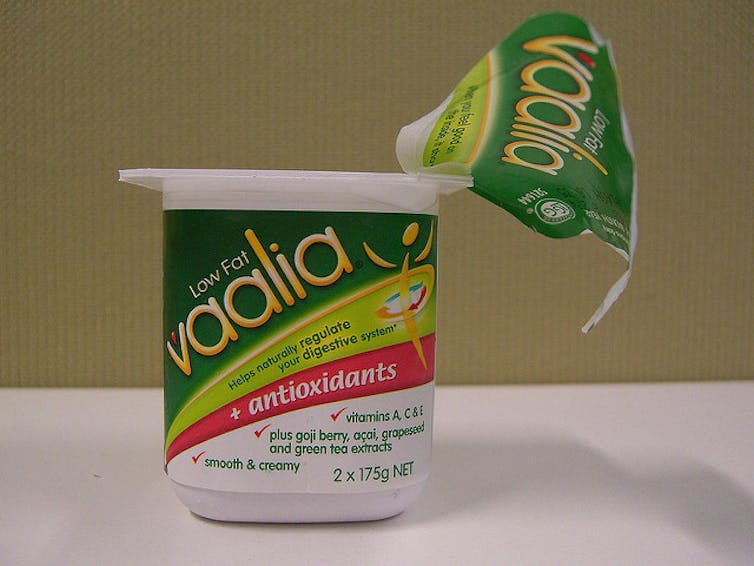
What is oxidation?
Oxidation is a common chemical reaction where electrons are transferred from one molecule to another. Electrons are one of the subatomic (smaller than an cantlet) particles that make up pretty much everything. As electrons move during an oxidation reaction, bonds can be broken and the construction of the molecules changed.
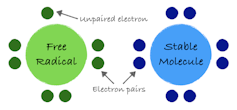
Not all oxidation reactions are bad. They are essential for life and involved in many important processes. In cellular respiration, glucose (a saccharide from the food we swallow) is oxidised past oxygen (from the air nosotros breathe), producing carbon dioxide, water and free energy to fuel our bodies. Household bleaches oxidise coloured stains into colourless molecules.
Less desirable oxidation reactions include the rusting of metals and oxidative food spoilage.
What are complimentary radicals?
Free radicals are just molecules with one or more than unpaired electrons. Electrons like to be in pairs, so unpaired electrons tin upshot in unstable and highly reactive molecules. To become stable, the gratis radical must steal an electron from another molecule (or give one abroad). When a molecule loses an electron, that molecule has been oxidised and itself becomes a free radical.
This new free radical can steal an electron from another molecule, starting a concatenation reaction. This procedure permanently changes the structure of the molecules, causing irreversible damage.
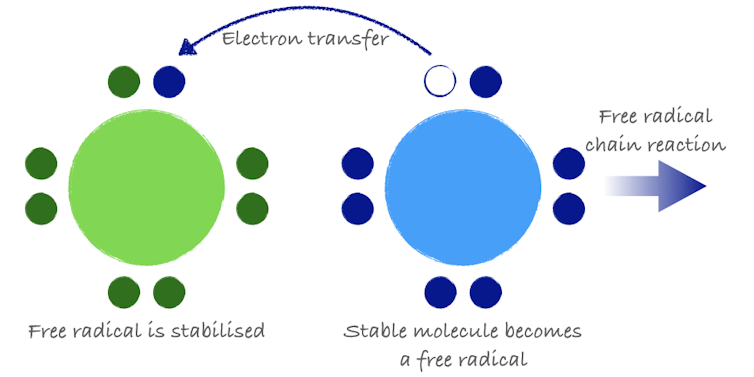
But if an antioxidant is nowadays, it can donate an electron to the free radical, stabilising it and stopping the concatenation reaction. The antioxidant sacrifices itself and is oxidised instead of the other molecule, becoming a free radical. But different most molecules, the antioxidant is able to stabilise the unpaired electron and does not become highly reactive. This process deactivates the antioxidant.
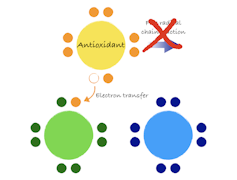
Free radicals aren't always bad for y'all. Their highly reactive and destructive nature is used by the body'southward immune system. Certain white blood cells, chosen phagocytes, can engulf foreign particles, such as bacteria, and so seal them off and release costless radicals to destroy them.
Gratuitous radicals are generated naturally by our bodies, but tin can exist increased by lifestyle factors such as stress, poor diet, pollution, smoking and alcohol. Our bodies can handle some free radicals, merely if too many are formed it can overwhelm the body's normal defences.
Free radical damage is idea to be i of the causes of ageing and contribute to diverse diseases. For example, free radical damage to Dna can crusade genetic mutations and promote cancer.
All antioxidants aren't equal
So, if gratis radicals are dangerous and crusade ageing and disease, and antioxidants tin can neutralise them, and then getting more antioxidants should exist good for you, shouldn't it? Unfortunately, it's not as simple as that. Yes, high antioxidant levels and low oxidative stress are associated with good health, but not all antioxidants are equal.

Antioxidants come up from many sources. Some are naturally produced in the trunk and some naturally occur in foods we swallow. Antioxidants (natural or constructed) can also be added to foods that don't normally contain them, either for their (supposed) wellness value or to preserve the food (antioxidants also prevent oxidation in foods).
A healthy nutrition is the most effective way to become the antioxidants your body needs. Fruits, vegetables, grains, eggs and basics are all useful sources of antioxidants. Despite the marketing hype, antioxidants plant in and then-called superfoods are no more effective than those in regular fruit and veg, then you're meliorate off saving your coin.
Just it's a unlike story when it comes to antioxidant supplements. Inquiry has found antioxidant supplements may cause more harm than expert. A 2012 meta analysis of over 70 trials plant antioxidant supplements are ineffective or even detrimental to health. The reasons are unclear, merely the added nutritional benefits from consuming antioxidants in a good for you nutrition is likely to contribute to this. Also, the high concentrations of antioxidants associated with supplement use tin can lead to problems.
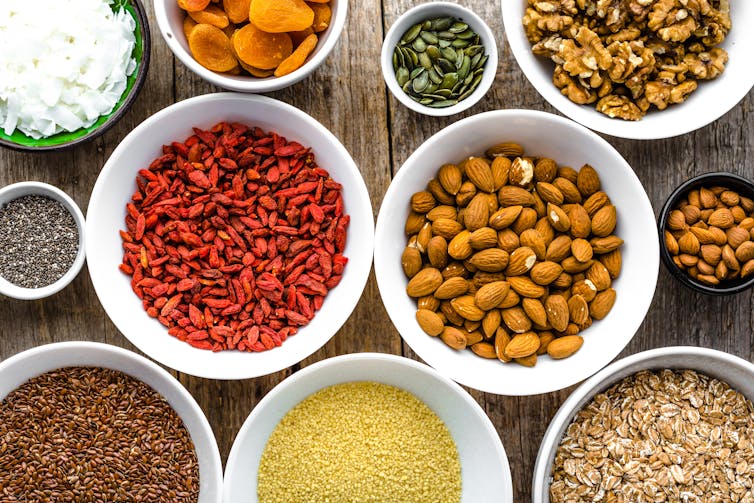
Besides much of a good thing
There are a number of reasons why high concentrations of antioxidants may be harmful. At loftier concentrations, antioxidants may:
- human activity as pro-oxidants, increasing oxidation
- protect dangerous cells (such every bit cancer cells) too every bit healthy cells
- reduce the health benefits of practise
- have unwanted side furnishings, such every bit nausea and headaches, or even achieve toxic levels.
There is no magic pill, but a good for you diet tin provide you with all the antioxidants you need to fight gratis radical impairment.
Source: https://theconversation.com/what-are-antioxidants-and-are-they-truly-good-for-us-86062
0 Response to "Antioxidants Donate an Electron to Make an Unhealthy Cell Healthy Again."
Post a Comment